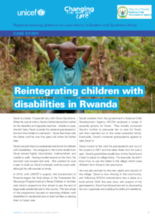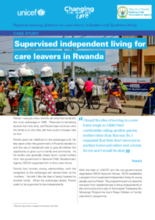This country page features an interactive, icon-based data dashboard providing a national-level overview of the status of children’s care and care reform efforts (a “Country Care Snapshot”), along with a list of resources and organizations in the country.
demographic_data
childrens_living_arrangement
children_living_without_bio
adoption
social_work_force
key_stakeholders
Key Stakeholders
Add New DataOther Relevant Reforms
Add New Datadrivers_of_institutionalisation
Drivers of Institutionaliziation
Add New Datakey_research_and_information
Key Data Sources
Add New DataReport on National Assessment of Centres caring for Children with Disabilities in Rwanda
National Integrated Child Rights Policy
Country Care Review: Rwanda
Prevalence and number of children living in institutional care: global, regional, and country estimates
The Way Forward Project Report
Community-Based Child Protection Mechanisms in Refugee Camps in Rwanda: An Ethnographic Study
Displaying 21 - 30 of 191
This case study documents the story of David's reintegration from a residential care home for children with disabilities in Rwanda to kinship care with his grandparents.
This UNICEF ESARO webinar discussed strategies for building strong families and communities and preventing child-family separation in the region.
This case study examines the transition of Patrick from residential care to being supported to live independently through a programme of supervised independent living for young people. This programme aims to ease the transition from residential care to living independently in the community and is part of the broader Tubarerere Mu Muryango Programme (Let’s Raise Children in Family) care reform programme in Rwanda.
Migrant families with children could be sent to Rwanda in future, a Home Office minister has told Parliament.
The government of Rwanda is in the final phases of its care reform program. Having reintegrated the majority of children from residential care back to families and communities, they are now working on the reintegration of children with disabilities. In this webinar, we hear from policymakers and practitioners on how this has been done and key lessons learned.
Migrant children could be sent to Rwanda by mistake if the UK Home Office wrongly decides they are adults, campaigners have warned. The Refugee Council raised concerns after highlighting errors it claims were made in some of the department’s age assessments for youngsters who have sought asylum in the UK.
This is the beginning of three virtual presentations on country examples of family reintegration, starting with Rwanda and Cambodia as part of the Task Force on Family Reunification and Reintegration on the Transforming Children's Care Global Collaborative Platform.
Why is it so important to consider mental health and emotional well-being in child care and child protection? How can we address mental health needs in a non-clinical environment?
The objective of this webinar was to present the CPSS approach, and reflect on how this approach, and especially the seven intermediate outcomes of CPSS are relevant to the care reform agenda.
In 2021, UNICEF launched its latest approach to Child Protection Systems Strengthening (CPSS), together with benchmarks for measuring the CPSS work, and high impact CPSS interventions. The objective of this webinar is to present this CPSS approach, and reflect on how this approach, and especially the seven intermediate outcomes of CPSS are relevant to the care reform agenda. Colleagues from Rwanda will share how care reform has been used as a strategic entry point to strengthen national Child Protection Systems and help explore how strengthening Child Protection Systems helps accelerate work on care reform.


